Resume
Audio Engineer Cover Letter Examples

May 29, 2025
|
12 min read
Craft an audio engineer cover letter that resonates, showcasing your sound skills and creativity. Fine-tune your approach, and let your professional experience amplify your chances. Get noticed in the audio industry with a smart, impactful letter.
4.70 Average rating
Rated by 348 people
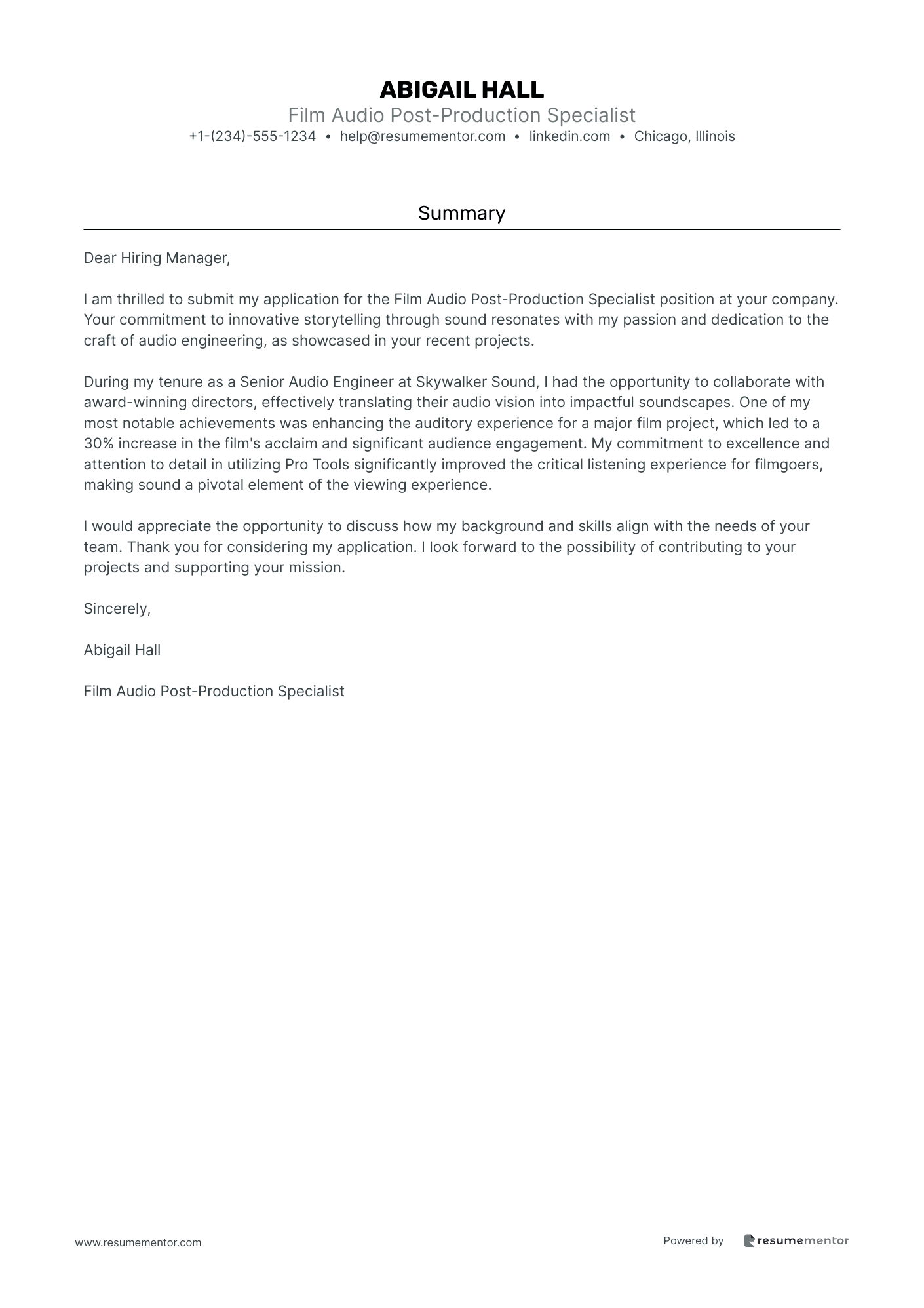
Film Audio Post-Production Specialist
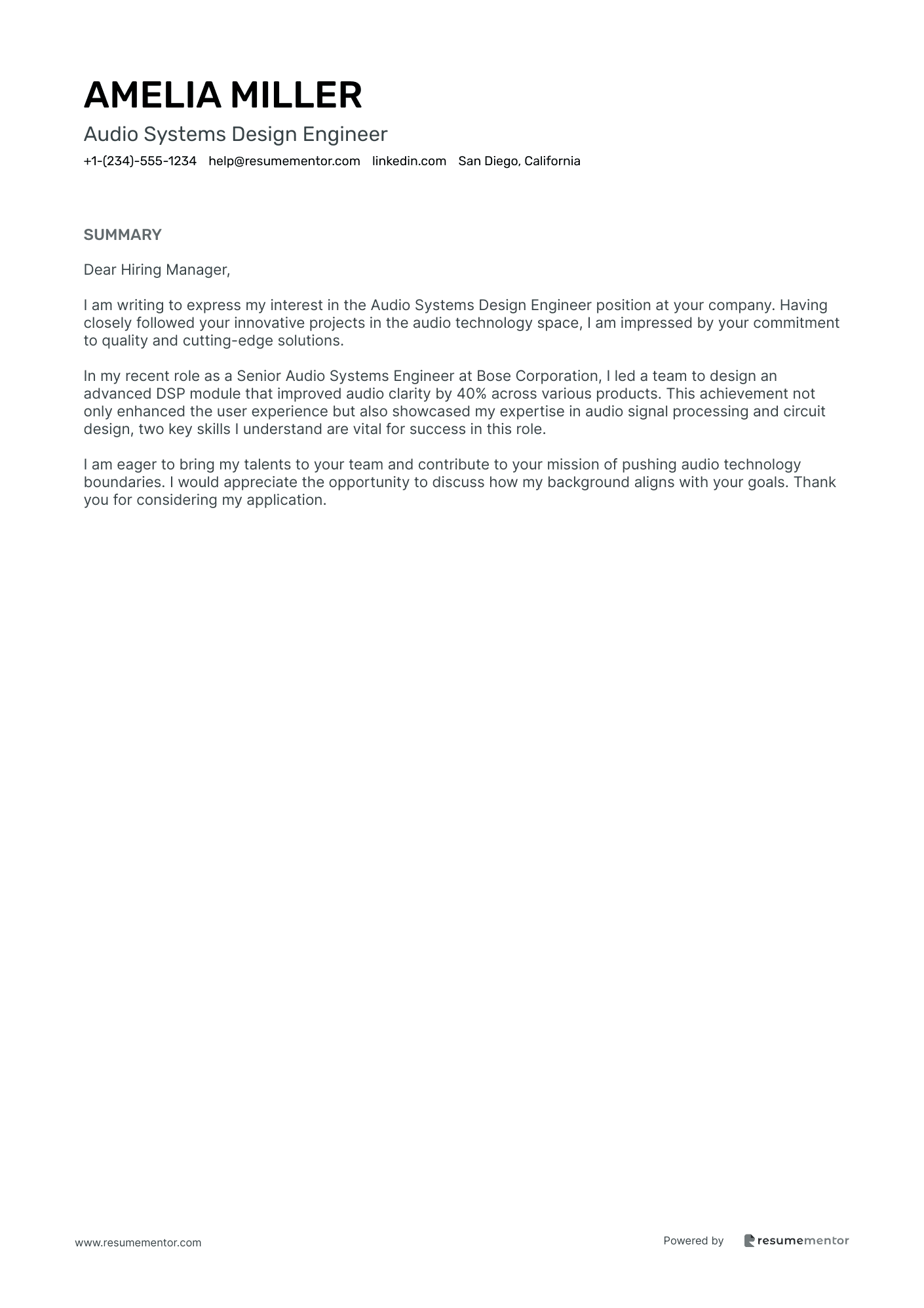
Audio Systems Design Engineer
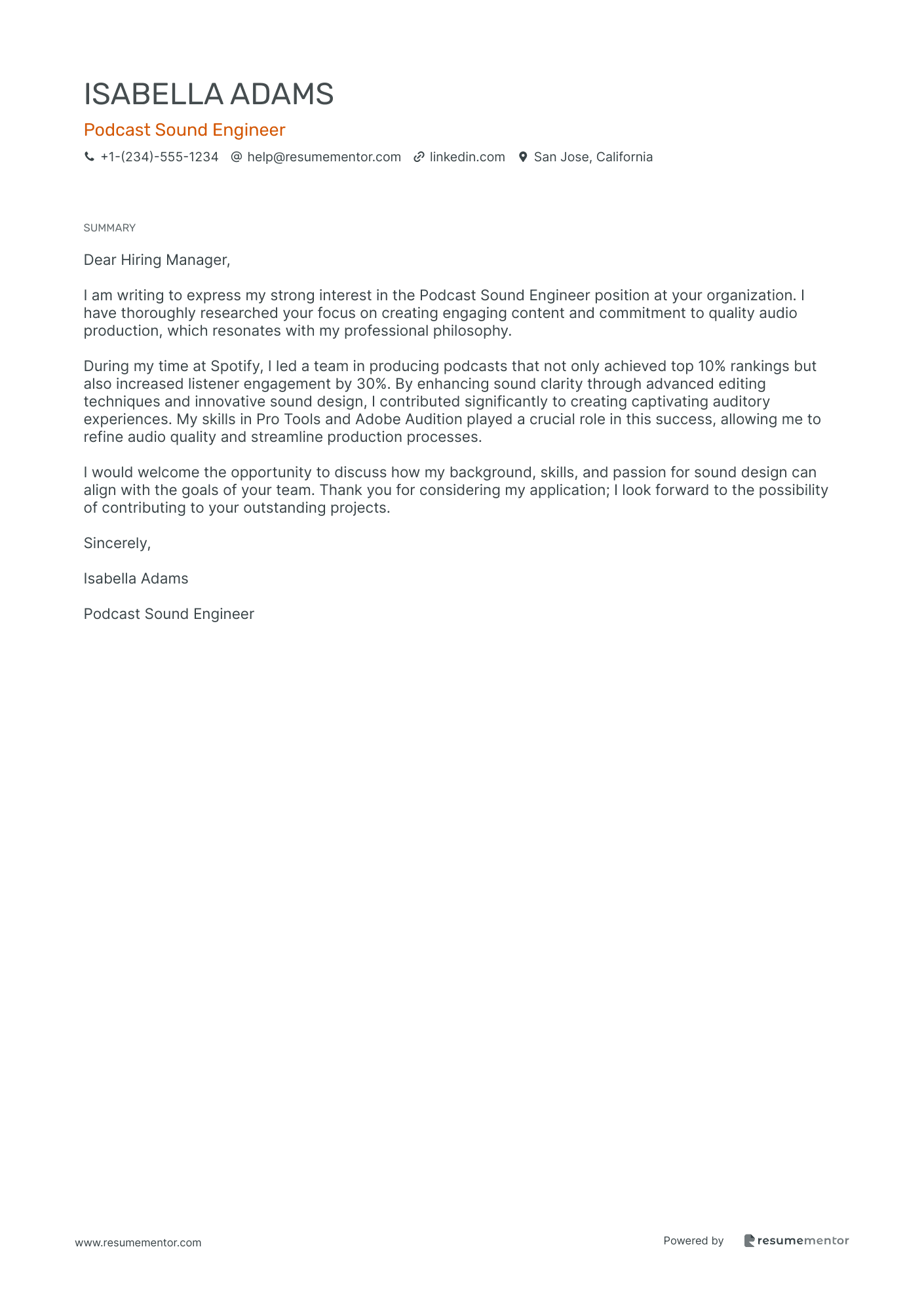
Podcast Sound Engineer
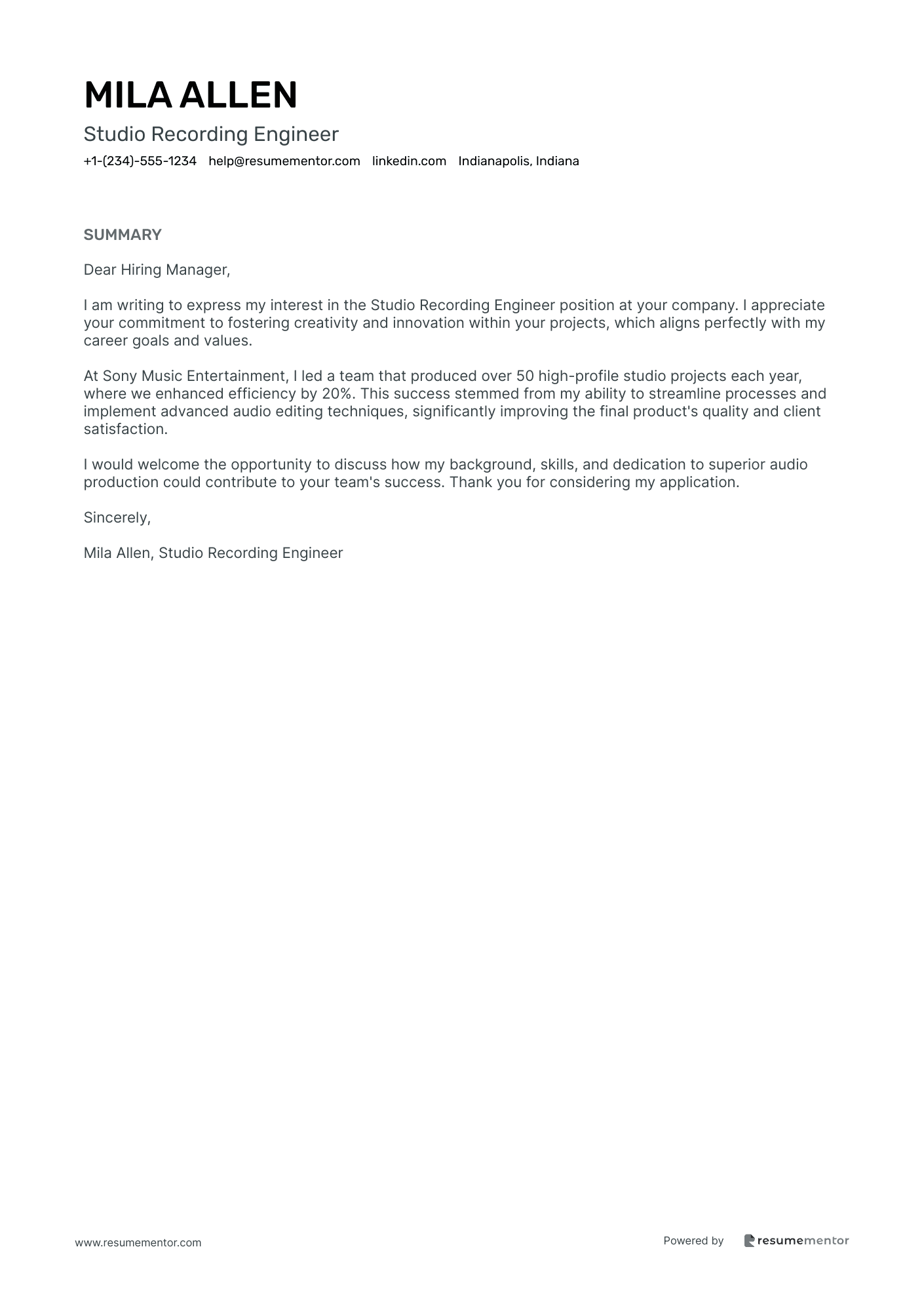
Studio Recording Engineer
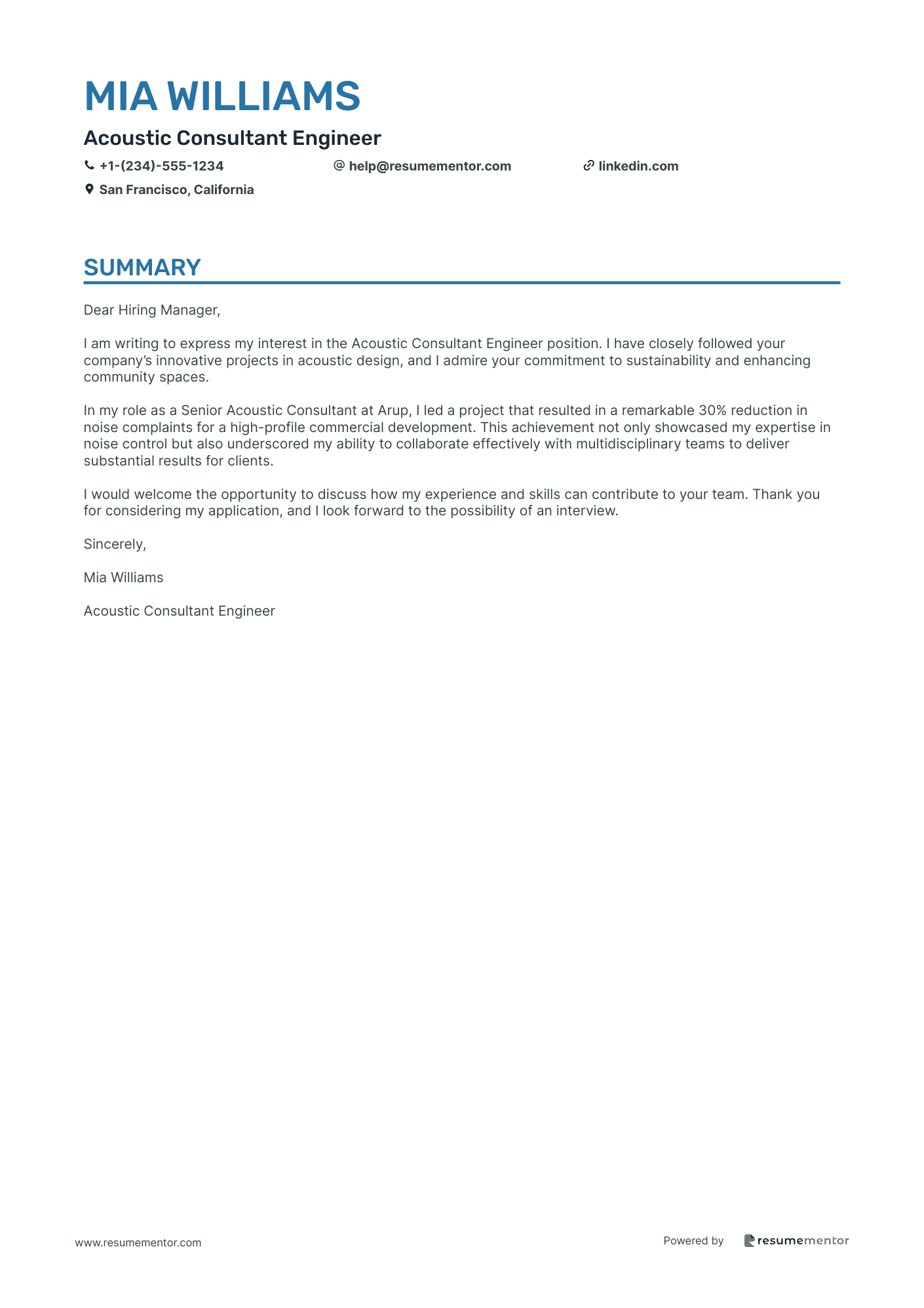
Acoustic Consultant Engineer
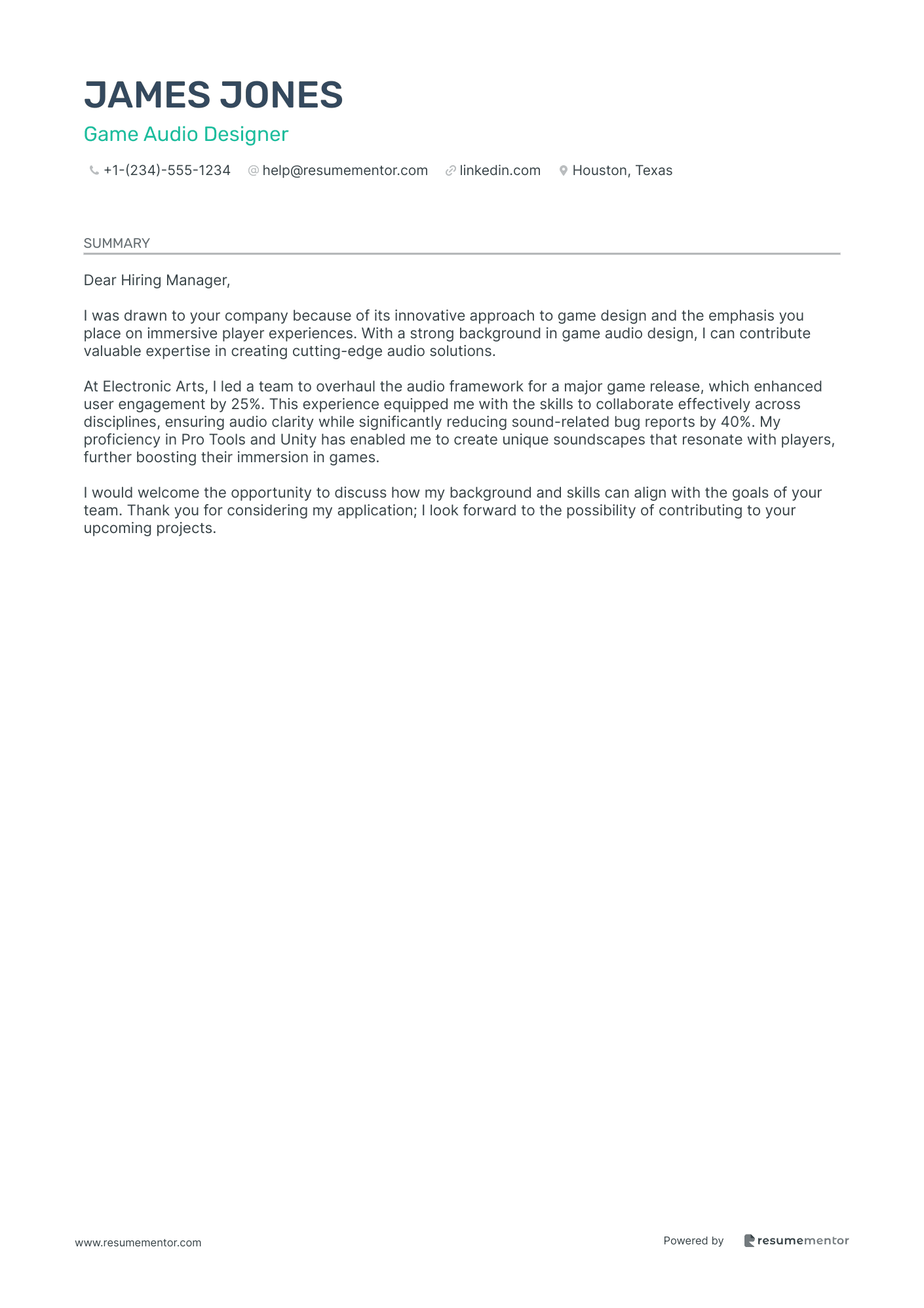
Game Audio Designer
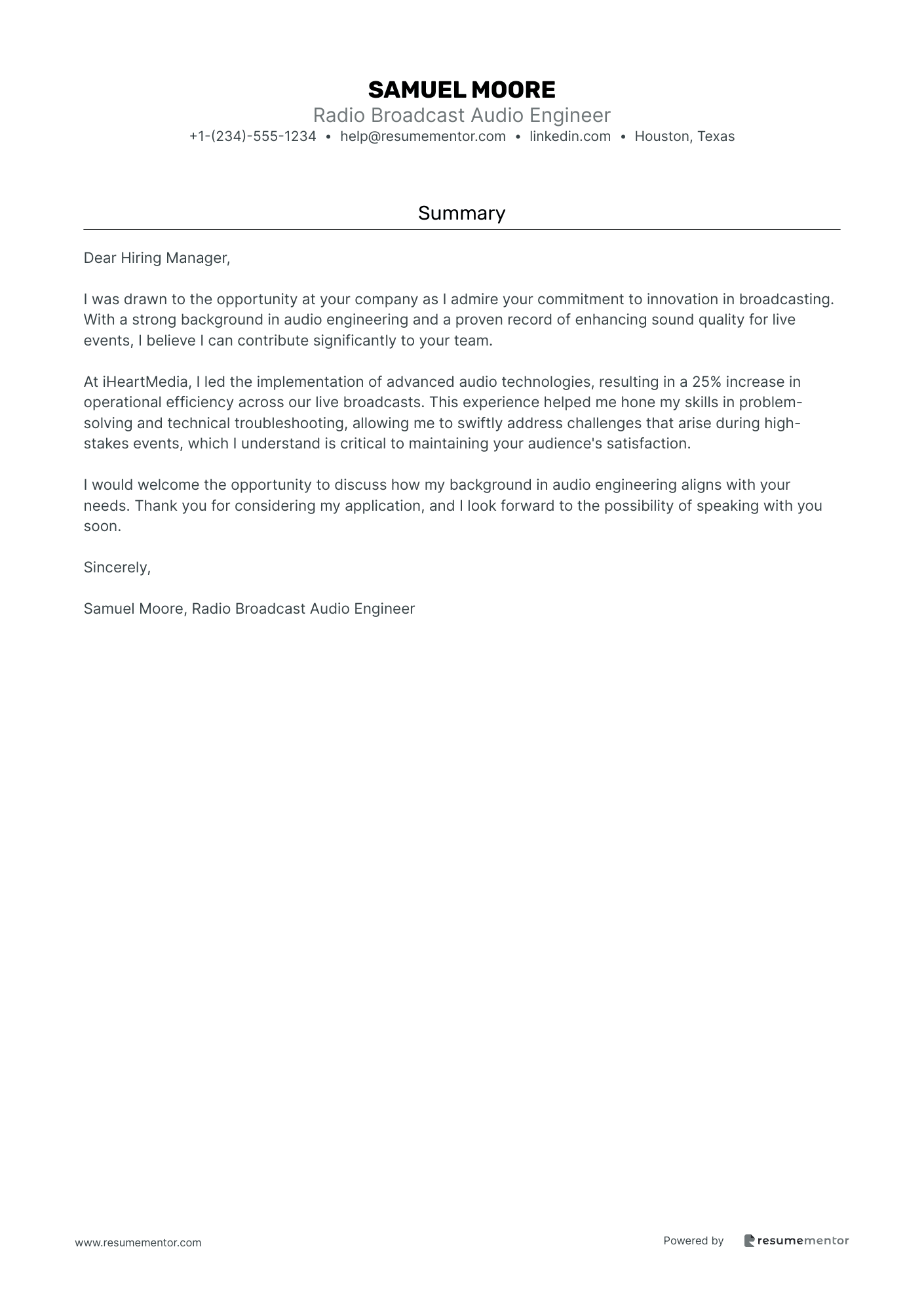
Radio Broadcast Audio Engineer
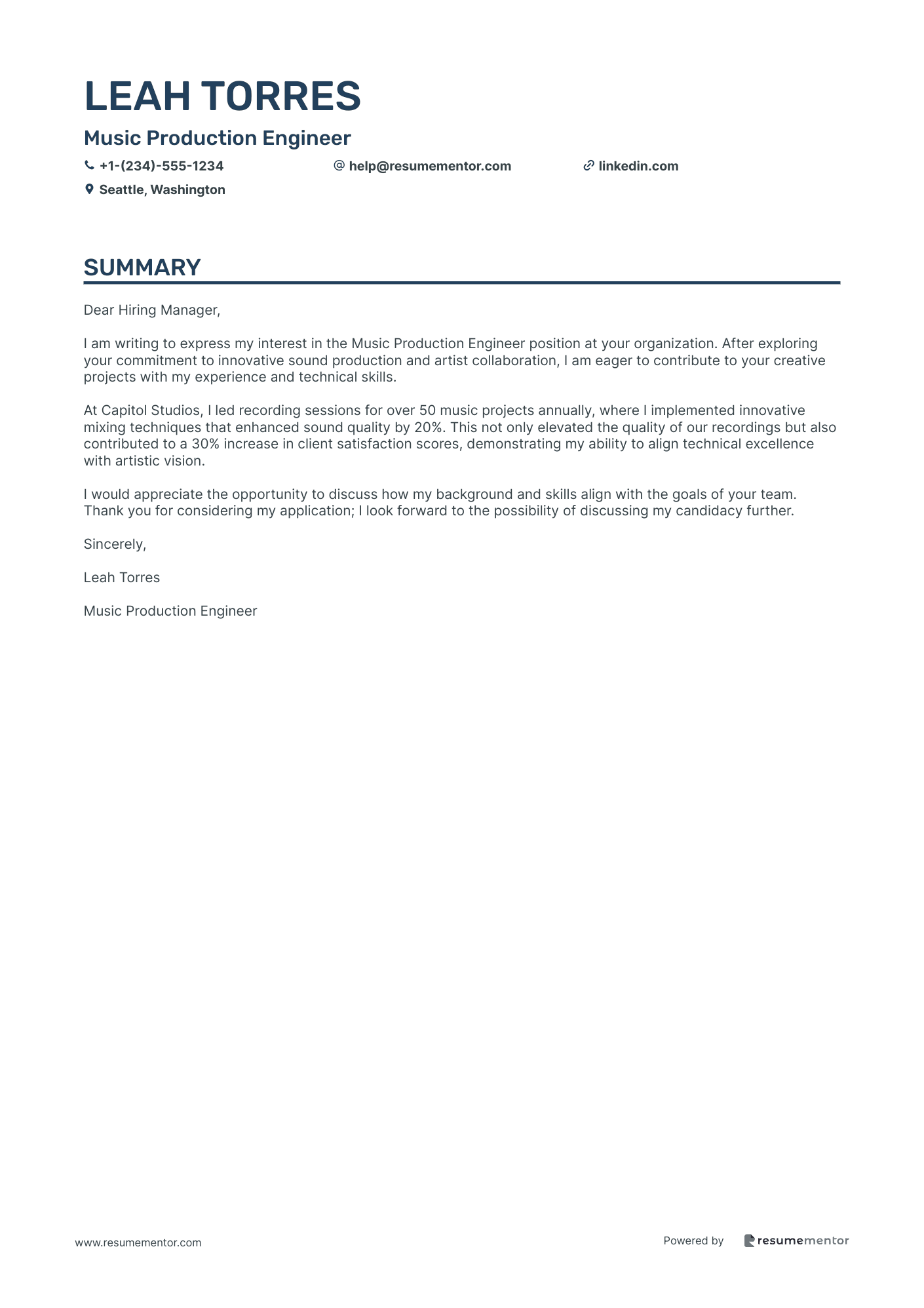
Music Production Engineer
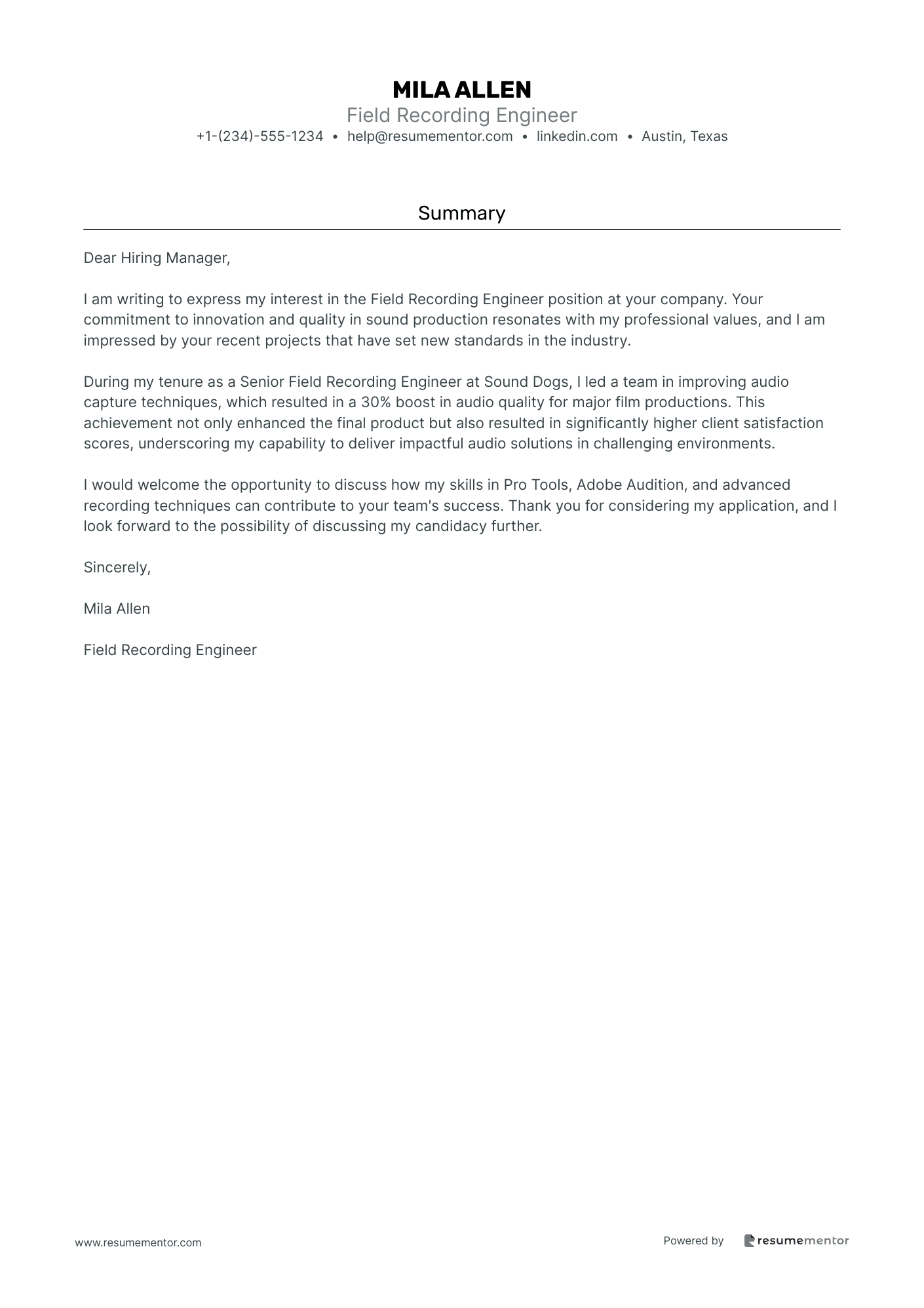
Field Recording Engineer

Film Audio Post-Production Specialist cover letter sample
When applying for this role, it's important to highlight your experience in audio editing software such as Pro Tools or Adobe Audition. Your ability to manage sound mixing and mastering should be clearly stated. Include any relevant coursework or certifications like 'Sound Design' or 'Audio Engineering' to showcase your expertise. Additionally, provide examples of successful projects where your skills improved audio quality or enhanced the overall production. Use a 'skill-action-result' approach to demonstrate how you added value in previous roles.
Abigail Hall
Film Audio Post-Production Specialist
Summary
Dear Hiring Manager,
I am thrilled to submit my application for the Film Audio Post-Production Specialist position at your company. Your commitment to innovative storytelling through sound resonates with my passion and dedication to the craft of audio engineering, as showcased in your recent projects.
During my tenure as a Senior Audio Engineer at Skywalker Sound, I had the opportunity to collaborate with award-winning directors, effectively translating their audio vision into impactful soundscapes. One of my most notable achievements was enhancing the auditory experience for a major film project, which led to a 30% increase in the film's acclaim and significant audience engagement. My commitment to excellence and attention to detail in utilizing Pro Tools significantly improved the critical listening experience for filmgoers, making sound a pivotal element of the viewing experience.
I would appreciate the opportunity to discuss how my background and skills align with the needs of your team. Thank you for considering my application. I look forward to the possibility of contributing to your projects and supporting your mission.
Sincerely,
Abigail Hall
Film Audio Post-Production Specialist
Audio Systems Design Engineer cover letter sample
Highlight your technical skills in circuit design and audio signal processing. Mention any relevant software experience, such as CAD tools or simulation programs. If you have certifications in audio engineering or completed related coursework, make sure to include those details for credibility. Provide specific examples of past projects where you improved system efficiency or sound quality. Use metrics to demonstrate the impact of your work, following a 'challenge-solution-outcome' format, to show how your expertise directly benefits the organization.
Amelia Miller
Audio Systems Design Engineer
Summary
Dear Hiring Manager,
I am writing to express my interest in the Audio Systems Design Engineer position at your company. Having closely followed your innovative projects in the audio technology space, I am impressed by your commitment to quality and cutting-edge solutions.
In my recent role as a Senior Audio Systems Engineer at Bose Corporation, I led a team to design an advanced DSP module that improved audio clarity by 40% across various products. This achievement not only enhanced the user experience but also showcased my expertise in audio signal processing and circuit design, two key skills I understand are vital for success in this role.
I am eager to bring my talents to your team and contribute to your mission of pushing audio technology boundaries. I would appreciate the opportunity to discuss how my background aligns with your goals. Thank you for considering my application.
Podcast Sound Engineer cover letter sample
When applying for this position, emphasize any experience with audio editing software like Pro Tools or Adobe Audition. Highlight your familiarity with mixing and mastering tracks, as well as any background in sound design. Include any relevant training or certifications, such as courses on audio engineering or acoustics. Provide specific examples of how your technical skills improved sound quality in past projects or enhanced listener engagement. Use a 'skill-action-result' format to demonstrate how your contributions have positively impacted previous productions.
Isabella Adams
Podcast Sound Engineer
Summary
Dear Hiring Manager,
I am writing to express my strong interest in the Podcast Sound Engineer position at your organization. I have thoroughly researched your focus on creating engaging content and commitment to quality audio production, which resonates with my professional philosophy.
During my time at Spotify, I led a team in producing podcasts that not only achieved top 10% rankings but also increased listener engagement by 30%. By enhancing sound clarity through advanced editing techniques and innovative sound design, I contributed significantly to creating captivating auditory experiences. My skills in Pro Tools and Adobe Audition played a crucial role in this success, allowing me to refine audio quality and streamline production processes.
I would welcome the opportunity to discuss how my background, skills, and passion for sound design can align with the goals of your team. Thank you for considering my application; I look forward to the possibility of contributing to your outstanding projects.
Sincerely,
Isabella Adams
Podcast Sound Engineer
Studio Recording Engineer cover letter sample
When crafting your cover letter, emphasize your technical skills with audio equipment and software. Highlight your experience with mixing, editing, and mastering tracks. Mention any relevant certifications, such as courses in sound engineering or music production, to demonstrate your commitment to the field. Provide specific examples of how your contributions enhanced the quality of projects, using the 'skill-action-result' approach. Additionally, showcase your ability to collaborate with artists and producers to achieve their vision, and include any notable projects you’ve worked on to add credibility.
Mila Allen
Studio Recording Engineer
Summary
Dear Hiring Manager,
I am writing to express my interest in the Studio Recording Engineer position at your company. I appreciate your commitment to fostering creativity and innovation within your projects, which aligns perfectly with my career goals and values.
At Sony Music Entertainment, I led a team that produced over 50 high-profile studio projects each year, where we enhanced efficiency by 20%. This success stemmed from my ability to streamline processes and implement advanced audio editing techniques, significantly improving the final product's quality and client satisfaction.
I would welcome the opportunity to discuss how my background, skills, and dedication to superior audio production could contribute to your team's success. Thank you for considering my application.
Sincerely,
Mila Allen, Studio Recording Engineer
Acoustic Consultant Engineer cover letter sample
When applying for this role, it's essential to highlight your experience in acoustic design, noise control, and sound analysis. Mention any projects that showcase your ability to deliver effective solutions to reduce sound pollution or improve acoustics in various environments. If you hold relevant certifications or have completed specialized training in acoustics, be sure to include these details. Provide examples of how your expertise has led to successful outcomes, using a clear 'skill-action-result' format to demonstrate the impact of your work on previous projects.
Mia Williams
Acoustic Consultant Engineer
Summary
Dear Hiring Manager,
I am writing to express my interest in the Acoustic Consultant Engineer position. I have closely followed your company’s innovative projects in acoustic design, and I admire your commitment to sustainability and enhancing community spaces.
In my role as a Senior Acoustic Consultant at Arup, I led a project that resulted in a remarkable 30% reduction in noise complaints for a high-profile commercial development. This achievement not only showcased my expertise in noise control but also underscored my ability to collaborate effectively with multidisciplinary teams to deliver substantial results for clients.
I would welcome the opportunity to discuss how my experience and skills can contribute to your team. Thank you for considering my application, and I look forward to the possibility of an interview.
Sincerely,
Mia Williams
Acoustic Consultant Engineer
Game Audio Designer cover letter sample
When applying for this role, it's important to showcase any previous experience in sound design or audio production. Highlight your proficiency with digital audio workstations and sound libraries. If you have completed courses in sound design or acoustics, mention these and the duration to demonstrate your knowledge. Provide examples of how your audio skills improved user experience or contributed to the project's success, using a 'skill-action-result' format. Additionally, discuss any collaborations with game developers or learning from feedback to illustrate your adaptability and growth.
Summary
Dear Hiring Manager,
I was drawn to your company because of its innovative approach to game design and the emphasis you place on immersive player experiences. With a strong background in game audio design, I can contribute valuable expertise in creating cutting-edge audio solutions.
At Electronic Arts, I led a team to overhaul the audio framework for a major game release, which enhanced user engagement by 25%. This experience equipped me with the skills to collaborate effectively across disciplines, ensuring audio clarity while significantly reducing sound-related bug reports by 40%. My proficiency in Pro Tools and Unity has enabled me to create unique soundscapes that resonate with players, further boosting their immersion in games.
I would welcome the opportunity to discuss how my background and skills can align with the goals of your team. Thank you for considering my application; I look forward to the possibility of contributing to your upcoming projects.
Radio Broadcast Audio Engineer cover letter sample
When crafting your cover letter, emphasize your technical proficiency with audio editing software and broadcasting equipment. Highlight any experience you have in live sound engineering or studio recording, showcasing your ability to adapt in fast-paced environments. Certifications in audio engineering or related fields can bolster your credibility. Also, discuss specific projects where your skills improved sound quality or enhanced the listening experience. Use the 'skill-action-result' framework to demonstrate how your contributions led to successful broadcasts or audience growth.
Samuel Moore
Radio Broadcast Audio Engineer
Summary
Dear Hiring Manager,
I was drawn to the opportunity at your company as I admire your commitment to innovation in broadcasting. With a strong background in audio engineering and a proven record of enhancing sound quality for live events, I believe I can contribute significantly to your team.
At iHeartMedia, I led the implementation of advanced audio technologies, resulting in a 25% increase in operational efficiency across our live broadcasts. This experience helped me hone my skills in problem-solving and technical troubleshooting, allowing me to swiftly address challenges that arise during high-stakes events, which I understand is critical to maintaining your audience's satisfaction.
I would welcome the opportunity to discuss how my background in audio engineering aligns with your needs. Thank you for considering my application, and I look forward to the possibility of speaking with you soon.
Sincerely,
Samuel Moore, Radio Broadcast Audio Engineer
Music Production Engineer cover letter sample
When crafting your cover letter, highlight your experience with various digital audio workstations (DAWs) like Pro Tools or Ableton Live. Emphasize your knowledge of sound design, mixing, and mastering techniques. Include any collaborations with artists or bands, showcasing how your contributions shaped their sound. If you've completed relevant courses or certifications in audio production, mention these to illustrate your commitment to continuous learning. Provide specific examples of projects where you improved audio quality or production efficiency, following a clear 'skill-action-result' format.
Leah Torres
Music Production Engineer
Summary
Dear Hiring Manager,
I am writing to express my interest in the Music Production Engineer position at your organization. After exploring your commitment to innovative sound production and artist collaboration, I am eager to contribute to your creative projects with my experience and technical skills.
At Capitol Studios, I led recording sessions for over 50 music projects annually, where I implemented innovative mixing techniques that enhanced sound quality by 20%. This not only elevated the quality of our recordings but also contributed to a 30% increase in client satisfaction scores, demonstrating my ability to align technical excellence with artistic vision.
I would appreciate the opportunity to discuss how my background and skills align with the goals of your team. Thank you for considering my application; I look forward to the possibility of discussing my candidacy further.
Sincerely,
Leah Torres
Music Production Engineer
Field Recording Engineer cover letter sample
When applying for this position, it's important to showcase any previous experience with recording equipment or audio software. Mention technical skills like microphone placement, audio mixing, or sound editing that you have mastered. Highlight any relevant projects you’ve worked on, including film, music, or live events. Use a 'skill-action-result' format to demonstrate how your expertise led to improved sound quality or client satisfaction. If you have collaborated with artists or production teams, include those experiences to show your teamwork in real-world scenarios.
Summary
Dear Hiring Manager,
I am writing to express my interest in the Field Recording Engineer position at your company. Your commitment to innovation and quality in sound production resonates with my professional values, and I am impressed by your recent projects that have set new standards in the industry.
During my tenure as a Senior Field Recording Engineer at Sound Dogs, I led a team in improving audio capture techniques, which resulted in a 30% boost in audio quality for major film productions. This achievement not only enhanced the final product but also resulted in significantly higher client satisfaction scores, underscoring my capability to deliver impactful audio solutions in challenging environments.
I would welcome the opportunity to discuss how my skills in Pro Tools, Adobe Audition, and advanced recording techniques can contribute to your team's success. Thank you for considering my application, and I look forward to the possibility of discussing my candidacy further.
Sincerely,
Mila Allen
Field Recording Engineer
Related Articles

Continue Reading
Check more recommended readings to get the job of your dreams.
Resume
Resources
Tools
© 2026. All rights reserved.
Made with love by people who care.
